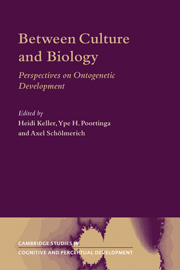Book contents
- Frontmatter
- Contents
- List of figures
- List of tables
- Notes on contributors
- Acknowledgements
- Introduction
- Part I Setting the scene
- 1 Culture, biology and development across history
- 2 Comparative developmental perspectives on culture: the great apes
- 3 The mutual definition of culture and biology in development
- Part II Perspectives on development informed by culture
- Part III Perspectives on development drawing from the universal and the specific
- Part IV Perspectives on development informed by evolutionary thinking
- Part V Metaperspectives
- Author index
- Subject index
- Cambridge Cultural Social Studies
3 - The mutual definition of culture and biology in development
Published online by Cambridge University Press: 22 September 2009
- Frontmatter
- Contents
- List of figures
- List of tables
- Notes on contributors
- Acknowledgements
- Introduction
- Part I Setting the scene
- 1 Culture, biology and development across history
- 2 Comparative developmental perspectives on culture: the great apes
- 3 The mutual definition of culture and biology in development
- Part II Perspectives on development informed by culture
- Part III Perspectives on development drawing from the universal and the specific
- Part IV Perspectives on development informed by evolutionary thinking
- Part V Metaperspectives
- Author index
- Subject index
- Cambridge Cultural Social Studies
Summary
The classical debate concerning nature and nurture implies a single relationship between biology and environment, even when the issue is resolved as an interaction between both forces. However, contrary to this perspective, my thesis is that there are not one but many relations between cultural environment and biological nature in human development. These relations constitute ways in which culture and biology mutually define and influence each other in development. I am going to illustrate this thesis with six relationships, taken one at a time. These relationships are tentative, meant to stimulate further research and thinking.
The relationships are not alternative perspectives, but complementary principles. By illustrating many principles with examples from the same community, I can present a clear case for complementarity. My research site is the Zinacantec Maya hamlet of Nabenchauk in Chiapas, Mexico. Examples from there and elsewhere show that all six principles are required to understand the roles of culture and biology in the developing human being. They will also illustrate the value of the theoretical principles for understanding real-world phenomena.
While complementarity is highlighted by utilizing material from a single community, at the same time generality is compromised. In addition, the examples are by-products of research designed for other purposes. The principles require not only further investigation in other settings, but also research that is designed to test these particular relationships. In this way, the principles can transcend the research of a few investigators.
- Type
- Chapter
- Information
- Between Culture and BiologyPerspectives on Ontogenetic Development, pp. 57 - 76Publisher: Cambridge University PressPrint publication year: 2002
- 18
- Cited by



